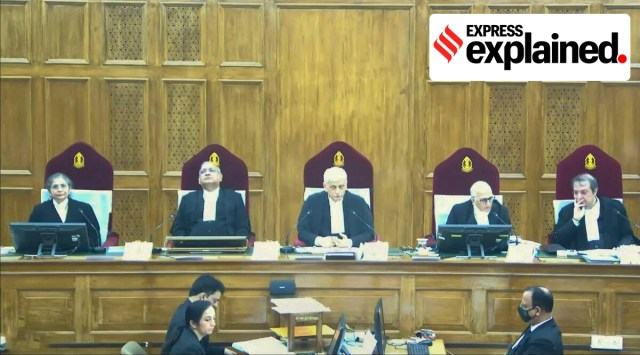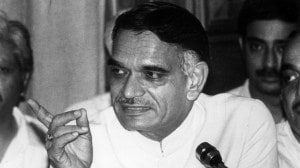Justice Bela Trivedi in her separate but concurring opinion upheld the amendment based on the presumption that “the legislature understands and appreciates the needs of its own people.”
Justice Pardiwala said that while he is “conscious of the fact that the economically weaker sections of the citizens are not declared as socially and economically backward classes (SEBCs) for the purpose of Article 15(4) of the Constitution”, separate reservations are not barred by the Constitution. His opinion cited the Right to Education, another constitutional amendment that puts an obligation on the state to provide free and compulsory primary education, as an example of other forms of reservation.
Minority Opinion: Justice Ravindra Bhat said while laws that provide benefits based on “only economic criteria” do not by themselves violate the right to equality, the Constitution envisages reservations to only be community-based and not individual- centric.
So while access “to public goods” such as tax breaks, subsidies can be allowed, reservation in public employment would not be permissible. “It is inconceivable that the deletion of caste (as long as Indian society believes in and practises the caste system) as a proscribed ground through a constitutional amendment would stand scrutiny,” he said.
Is exclusion of SC/ST, SEBC from quota discriminatory?
Majority Opinion: No. Justice Maheshwari said that “there cannot be competition of claims for affirmative action based on disadvantages.” Reservation cannot be denied to one section (the EWS) because “that segment is otherwise not suffering from other disadvantages.”
Story continues below this ad
Justice Pardiwala said that Article 16(4) is exhaustive for reservation in favour of backward classes but the section is not exhaustive of the concept of reservation. The new constitutional amendment introducing another affirmative action method is read as separate and distinct.
Minority Opinion: This exclusion is the main ground for striking down the constitutional amendment as per the minority opinion. Justice Bhat gave three reasons why the exclusion of SC/ST/OBC is unconstitutional.
First, it “others” those subjected to socially questionable and outlawed practices, though they are amongst the poorest sections of society, and goes against the idea of fraternity. Second, the exclusion virtually confines SC/ST/OBC within their allocated reservation quotas (15 per cent for SCs, 7.5 per cent for STs, 27 per cent for OBCs). Third, it denies the chance of “mobility from the reserved quota (based on past discrimination) to a reservation benefit based only on economic deprivation.”
Can quota for poor breach the 50% ceiling for reservations?
Several issues in the EWS quota challenge were based on crucial aspects already decided by the Supreme Court in the landmark 1992 Indra Sawhney vs Union of India verdict.
Story continues below this ad
A nine-judge Bench had upheld 27 per cent quota for OBCs but had struck down the 10 per cent quota based on economic criteria. The first key point in that ruling was that “a backward class cannot be determined only and exclusively with reference to economic criterion”. “It may be a consideration or basis along with, and in addition to, social backwardness, but it can never be the sole criterion,” the court had held.
Second, the SC held that reservation cannot cross 50 per cent, unless a special case was made out in “extraordinary situations and peculiar conditions”.
In the current case, a five-judge court could not have overruled Indra Sawhney, which was delivered by a larger bench, but found reasoning to uphold the EWS quota.
Majority opinion: The majority opinion by Justice Maheshwari held that the 50 per cent ceiling was for backward classes and it “overstretched to the reservation provided for entirely different class, consisting of the economically weaker sections”. “Moreover…this ceiling limit…has not been held to be inflexible and inviolable for all times to come.”
Story continues below this ad
Minority view: Although Justice Bhat refrained from expressing a view on whether it is permissible to breach the 50 per cent ceiling, the minority opinion warned that breaching it could “eat up the rule of equality.” The minority opinion also stated that going above 50 per cent “becomes a gateway for further infractions…” However, since the question is also pending before another Constitution bench — on whether a Tamil Nadu law providing for reservation in excess of the 50 per cent limit is unconstitutional — Justice Bhat did not “seal the fate of the pending litigation…”
Can private colleges be forced to have EWS quota?
Under Article 15(5) of the Constitution, the state has power to make reservations in private educational institutions.
Only Justice Maheshwari’s opinion, part of the majority view, engaged with this issue to an extent. “Unaided private institutions, including those imparting professional education, cannot be seen as standing out of the national mainstream. As held in the aforementioned judgments, reservations in private institutions is not per se violative of the basic structure. Thus, reservations as a concept cannot be ruled out in private institutions where education is imparted,” the opinion stated.
The opinion added that Parliament now would have had the benefit of the Supreme Court’s earlier verdict upholding the constitutional amendment that introduced the Right to Education.








































